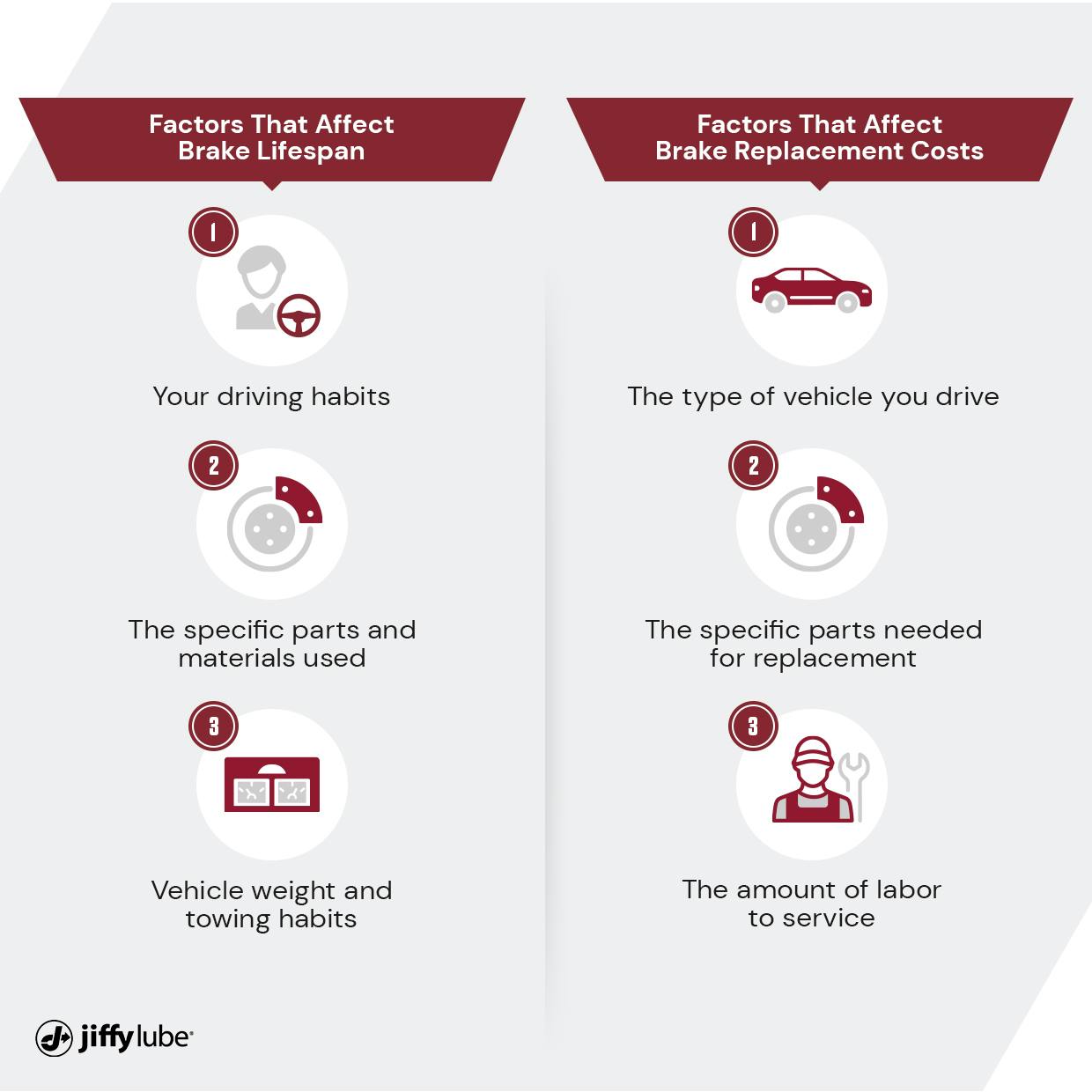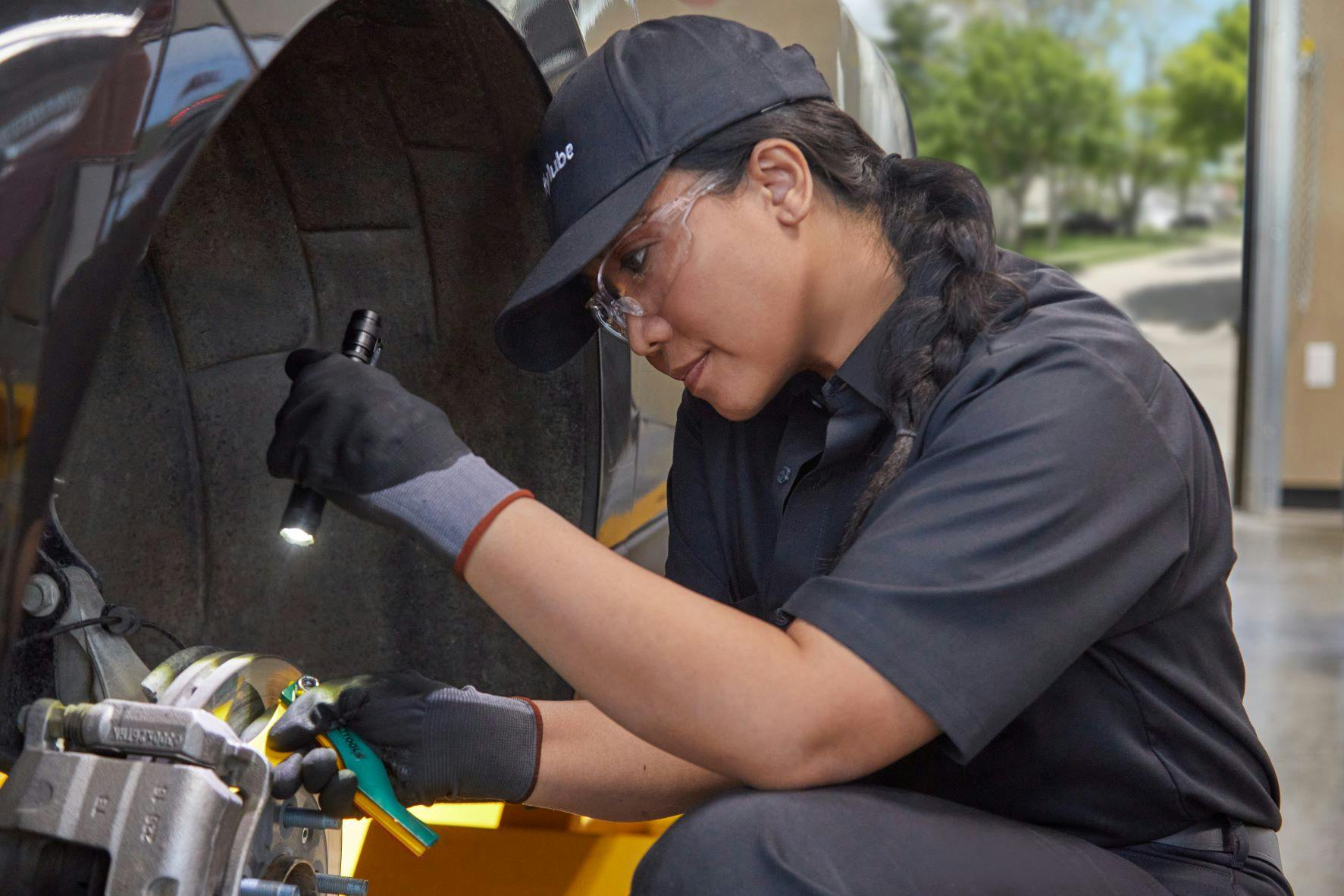Your brakes are essential to your safety, and to the safety of every pedestrian and driver you encounter on the road. You know the signs that you may need brake service…..but you may be wondering, “What is the cost of brake replacement?”
How Much Are New Brakes, And How Often You Need Them, Depends On You And Your Car
- Where you drive impacts your brake service. For example, city driving, with stop-and-go traffic, or a mountainous terrain, which has drivers riding the brakes to control downhill speeds, can shorten the lifespan of your braking system
- Another factor is the parts and materials used.
Brake pads, rotors, and calipers are all made of different materials, which can affect durability. For example:
- High carbon based “severe duty” brake pads can be more expensive but may last longer than those of standard semi-metallic material
- Ceramic brake pads generally provide quieter braking and less dusting, but their long-term braking performance may not be as great as a semi-metallic pad
- Brake pads should always be replaced with pads that meet or exceed the manufacturer recommendations for your vehicle.
Benefits of Regular Brake Replacement & Maintenance
You may find yourself asking “what’s the cost of brake replacement” less frequently if you perform regular preventive maintenance. When you do focus on regular brake maintenance and replacement, it can:
- Minimize repairs— Without regular brake service, your brakes can reach the “metal-to-metal” point, which means the brake pads or shoes have worn through all their friction material. Allowing your brakes to get to this point is dangerous and can lead to expensive repairs, especially on the rotors and drums.
- Extend caliper life — Replacing brake fluid regularly can help extend caliper life. Check your owner’s manual for the specific recommendations on how often brake fluid replacement should occur for your vehicle. If you can’t find your manual or it doesn’t include a recommendation, talk to a trained technician.
- Prevent corrosion in the hydraulic system — Contaminated brake fluid can cause corrosion in your brake hydraulic system, especially on vehicles with anti-lock brakes (ABS). Periodically exchanging the fluid in your brake hydraulic system can help counter this problem.
- Keep you safe on the road — A properly maintained brake system helps ensure safe vehicle control and operation under a wide range of conditions. If you suspect any problems, get your brake system checked immediately since it’s your vehicle’s most critical safety system.
So, What Is The Cost Of Brake Replacement?
Unfortunately, there is no standard answer. Every automotive repair center charges an hourly rate specific to their business, and each manufacturer prices its parts differently. However, we do have a few guidelines to help you plan:
- Replacing rotors with your brake pads is critical to help optimize braking and help ensure safety. New pads on worn rotors can create issues with the new pads, cause vibration, or make braking less safe. So, plan to purchase new pads and new rotors together.
- Each aftermarket rotor costs an average of $30 to $75
- Labor to service brakes can run from $90 to $200 per hour. Brake service generally runs approximately $200 to $500 per axle at a professional center.
- Calipers are typically the most difficult and expensive aspect of the braking system to service. A single caliper can cost up to $130 and several will reach prices even higher.
- A complete brake repair that includes pads, rotors, and calipers typically averages between $200 and $800 depending on the vehicle and parts used.
Get A Good Price
To help ensure you get value for your investment, request quotes from several service providers. For an accurate quote, your conversation with each repair facility should go beyond asking, “How much are new brakes?” During the quote process, you can expect automotive technicians to ask you questions such as:
- What type of vehicle do you drive? Typically, parts for European-made vehicles (BMW, Mercedes, Audi, Jaguar, etc.) will cost more than parts for domestic or Japanese-made vehicles. Also, since European systems differ from American systems, the technician may require more time to perform the service, which could mean higher labor costs.
- What model do you drive? Make and model count, and here’s why … The driver of a Chevy 3500 Diesel truck will pay more for new brakes than the driver of a Ford Fiesta. Many 4WD and AWD cars have rotors that require more steps — and more time — to replace. Size, weight, and type of drive all play a role in the materials required and the time brake service will take.
- What type of driving do you do? If you operate a vehicle that does a lot of towing, or severe duty work, you’ll require the appropriate brake pad
- What materials do you want to use? Brake pads and shoes come in a variety of materials — ceramic, semi-metallic and organic. They perform differently and come with varying price tags.
- Do you prefer aftermarket, off-brand or OEM (original equipment manufacturer) brake pads? Your response will impact the pricing estimate.

Brake Replacement
Keep In Mind That Safety Should Come Before Cost
Your brakes are one of your car’s essential safety features and you need them in good working order. Drivers can save money by performing brake service themselves, but not everyone is mechanically inclined or comfortable with such an important task. If you don’t have the time or know-how to handle the job yourself, bring your car to one of over 2,000 Jiffy Lube locations, where the training technicians are happy to help.
What to Expect When You Visit Jiffy Lube
When you arrive at Jiffy Lube, you can expect:
- To be asked about your driving style
- A complete visual inspection of your brake system will be performed (wheels on)
- A more thorough brake inspection will be performed with a tire rotation
- Brake fluid will be tested for moisture content and/or additive package strength
- Service recommendations will be presented, and no work will be performed without your approval
- Your vehicle will be driven before and after the brake service to help ensure your vehicle is operating as intended
You can then take to the road with confidence that when your foot presses the pedal, your brakes will respond as they’re designed to.

Read More About It.
Do you know when and how to properly use your emergency brake? This article spells it out.
Please note: Not all services are offered at all Jiffy Lube service centers. Please call ahead or visit jiffylube.com for services offered at your local Jiffy Lube service center.


